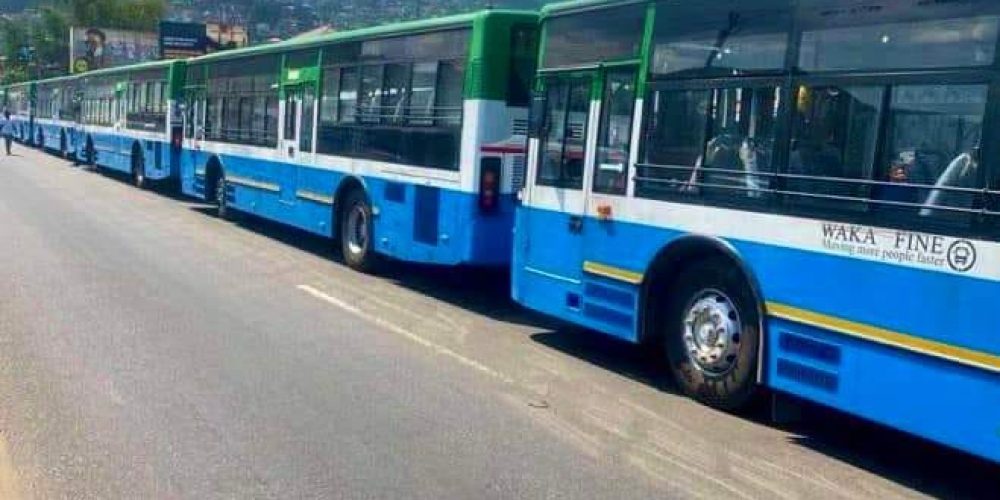By Robert Kondema Kargbo
One of the loyalists and committed ministers in the SLPP government of President Julius Maada Bio is Fanday Turay, the Minister of Transport and Aviation whose recent reforms in the Public Transport Sector has put Freetown, the capital city of Sierra Leone, in the trajectory of becoming a modern and organised city in West Africa.
One of President Bio’s manifesto promises, which he called the “Big Five Game Changers”, is Technology and Infrastructure Programmes to Serve as Pathways for Sustained Economic Growth. This initiative prioritizes the development of technological infrastructure to foster innovation, connectivity, and economic advancement. And to foster connectivity, there should be a sanitized transport system in the country, especially in the capital city and major provincial towns and cities.
Acknowledging that one of the bottlenecks to free movements of goods and services in the Western Area is the unnecessary traffic; the Ministry of Transport and Aviation under the leadership of Fanday Turay has just introduced key reforms in the Public Transport Sector through the Sierra Leone Integrated and Resilient Urban Mobility Project (SLIRUMP).
Key amongst these reforms is the designation of public transport operating hours for formalized bus operators contracted by SLPTA. This means from Monday to Saturday, for instance, between 6am to 10pm Sani Abacha Street will be a “Bus Only Road” during public transport operating hours while Savage Street will be a two-way for public transport. The only exceptions to this are the Presidential convoy, the Vice Presidential convoy, the Speaker of Parliament, Official delegation, Emergency vehicles and school buses.
Added to that, timber sellers and other construction materials are prohibited from occupying the public transport corridors. All timber sellers and building contractors are to operate in a fully enclosed works yard. Also, all vehicle maintenance garages must operate in an enclosed works yard away from the carriage and pedestrian walkways. All vehicular obstructions along the carriage ways (whether in an accident or faulty) must be removed within 30 minutes. Beyond 30 minutes vehicular obstructions will be towed to an impound yard. And all public transport operators are to pick up and drop off passengers at designated bus stop locations along the corridors. Private vehicles may cross dedicated public transport lanes to use designated lay-bys.
What is more interesting and good for the ease of free movements of goods and services in the Western Area is that under this new arrangement, there is restriction on Okada and Keke operations on the Public Transport Corridor except clearly label delivery Motorbikes. All Okadas and Kekes are to be licensed with SLPTA, zoned for provision of last mile journey services including provision of adequate parking facilities with health and safety considerations.
But how will these designations and restrictions be monitored and enforced? The Ministry of Transport and Aviation, through the Sierra Leone Integrated and Resilient Urban Mobility Project (SLIRUMP), has instituted a joint enforcement task force consisting of personnel from SLP, SLRSA, Met Police and the Military Police to specifically monitor bus priority.
Since the day the House of Sierra Leone Parliament approved the appointment of Fanday Turay as Minister of Transport and Aviation, many Sierra Leoneans who have been following his public life know he will perform his duties well and to the best of his ability.
This is not the first time that Fanday Turay has been in the spotlight for the very right reasons. In the recent past, he was Sierra Leone’s Permanent Representative to the United Nations.
Before that, Fanday Turay served as Security Adviser at the United Nations Disengagement Observer Force (UNDOF) in the Syrian Golan for about 14 years. He chaired the National Commission for Privatization in Sierra Leone in 2019.
In 2009, he was appointed Special Assistant to the Chief of Staff at the Office of Military Affairs in the United Nations Department of Peacekeeping Operations. Before that, he served as Legal Advisor at the Ministry of Defence in Freetown and as a Brigade Commander in the Republic of Sierra Leone Armed Forces (RSLAF) between 2008 and 2011. From 2006 to 2008, he was a Battalion Commander.
In the 1990s, he assumed various posts, including Chief of Personnel Manning Joint Forces Headquarters, Aide-de-Camp to the Head of State and Military Adviser to the Permanent Mission of Sierra Leone to the United Nations in New York. He also participated in the Economic Community of West African State (ECOWAS) Monitoring Group in Liberia, in both command and staff roles.
A lawyer by profession, Fanday Turay holds master’s degrees in international transport and maritime law from the London Metropolitan University and also in international affairs from the University of Ghana. He also earned a Bachelor of Laws degree from the University of West London.
Copyright –Published in Expo Times News on Monday, February 5th, 2024 (ExpoTimes News – Expo Media Group (expomediasl.com)





